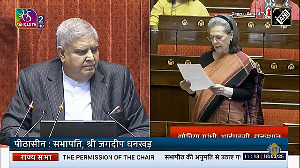There is not much that one can do, but a few things that sometimes one has to do -- legal notices or court summons, issues about passports and documents, child custody cases etc -- where the intensely personal gets entangled with the official.
One day, I got an e-mail rather than a letter -- true to the Silicon Valley spirit -- from an Indian, let us call him Shankar (all names and characteristics changed for obvious reasons) wanting to see me on a strictly private matter.
The e-mail said he worked at Google and wanted an appointment on a Tuesday afternoon, when he could take some time off to visit me in the consulate. Guys and gals in Google are almost by definition young and very bright, and I was curious. The 'private' in the mail suggested marital problems, as it was unlikely that for someone from such a company, it would be a financial or a criminal issue.
Shankar, when he arrived appeared truly distraught. He looked incredibly young, handsome despite his dishevelled look, and pleasant and polite in his demeanour.
"I have a serious problem, Sir, it relates to dowry," he said after he had told me his background, which was fairly typical. The only son of a mathematics teacher in a district town in Karnataka, he had done engineering and then a MS in America. He had worked for one or two companies in Texas, but had come to Silicon Valley with a challenging job with Google.
My first instinct was to think that this related to his sister, back in India. May be, he was being asked to cough up large amounts of dowry for his sister, given his Google status; may be he was being offered a huge sum by a prospective father-in-law and he was reluctant -- for he didn't appear to be the dowry demanding type, though I knew that anything was possible.
Problems of brides or young wives are indeed the majority of the cases that come to a consulate; dowry demands are a major cause of harassment or abuse leading to breakdowns. "Where exactly do we come in?" I thought and asked him as much, nicely. Demanding dowry is an official offence, of course, but from afar, how exactly to intervene?
"Sir, my mother is dying, but, I am afraid to go back to India to visit her. They may arrest me. I just don't know what to do. My wife's family are hell bent on taking revenge," he said virtually sobbing. "I am a 498-A case Sir," he confided as though that formula would reveal everything to me.
I was dumbfounded. In my job, I have seen many women in heart rending distress -- abandoned abroad by husbands with fake or fraudulent marriages, others battered and so badly traumatised that they have to be repatriated, and other variants of cruelty, deceit and worse. Indeed, such cases are typical, but this one did not appear to be. It seemed to be the other side of the equation, a young man in great anguish, an unintended victim of a system that was primarily trying to address the vulnerability of women abused, tormented, or even killed by the dowry demanders.
I am yet to tell you Shankar's sad story. But first let me tell you that it is not one individual's story. There are perhaps hundreds in Silicon Valley living this tale. I must emphasise, however, that there are thousands living the story of the standard paradigm --harassing the girl's family.
Shankar was not doing that, of that I am convinced, having come to know him. Here is this phenomenon, which demands to be better known. But before coming to Shankar's specific story, let me broaden it to create a general profile using the many examples that I now know of such cases.
Let us start with a young engineer working at Google or Intel or Microsoft and putting in 12 hour work days. He is an ace in what he does with his computer. And does very little besides that. Working at a prestigious company with a sizable pay packet, he goes home, on a three week vacation, but also with the intention to get married. He has a great job, is already 29, but living in San Jose, has little time or talent to date girls. Besides, he wants a good, traditional South Indian wife. When he reaches home, his parents have already lined up five girls for him to see. A short list since after all he has only three weeks.
The girls are all pretty, 'from good families', well educated in the fancy schools and colleges, and are really smart. They have their own dreams and aspirations, will not marry just anyone, some are already professionals too, but the visitor after all, is what he is -- an upwardly mobile suitable boy.
The marriage is swift, all finalised in one week, but lavish. Soon thereafter our young groom is back at his work, at his computer, and in his lonely flat. The newly wedded wife follows a few months later; they are lucky to have got the visa so fast, unlike some others who have to languish at home for years.
Life in America, in Silicon Valley, does not turn out to be what the girl had dreamt it to be. She is herself a M Sc in bio-chemistry, or a programmer, but cannot get a job in America, with her dependent H-4 visa status. The husband is out of the house at seven in the morning and the young wife is terribly lonely and bored to death in the apartment block with no friendly neighbours, no relatives, and no excitement. She had so much fun in college, hanging out with her friends at Cafe Coffee Dday in her city, they had so many places to go to and people to visit, but here in Silicon Valley, all that is missing.
The husband when he comes home and on weekends is very sweet, but not terribly romantic.
There can be -- and there usually are -- other complications in my painted profile. The boy's elderly parents may stay or come to visit them and put additional strain on the couple with their strict conservative habits. They too are lonely in America and frictions may get compounded. The boy himself may be a social nerd or a religious zealot and the independent minded girl may feel hopelessly stifled. The girl may want to work, but the boy is content with a cook.
But you don't need complications. It is the law of nature and statistics that certain percentage of all marriages are bound to be problematic. The high expectations and low returns in these cases only accentuate them.
To fast forward this sad story, a time comes when the girl returns to India. She is frustrated and embittered, but there is serious loss of face, as well. Here comes a twist, which brings us back to Shankar's story.
With all good intentions, we have the law in India under which if a girl or her family claims that they are harassed with dowry demands, before or after marriage, it becomes a cognisable offence. Once the case is registered with the police, there is a prima facie assumption of guilt on the part of the boy or his family. The case may or may not go to the court, most often the parties come to an out-of-the court-settlement, but the agony starts.
The objective of the law is to give protection to weak and vulnerable women by invoking the fear of this law as a deterrent. But as Shankar's story illustrates there are now a number of cases with unintended consequences: Where this provision is used as an instrument for pressure, settlement or merely as face saving in cases of broken marriages.
The results are traumatic particularly when the two young partners find themselves in two different countries, sometimes with a child being fought over for custody, sometimes with elderly parents too victimised in the battle.
In Shankar's case his fear is that he may get hauled up the moment he reaches Bangalore to visit his ailing mother, as his wife's family had filed 498-A against him and his parents.
The awareness of such problems is growing in India and in America too, though we have a long way to go in finding remedies. I must emphasise once again that in no way are such examples reflective of the majority of cases where the woman is the victim, nor do they in any way detract from the very real problem of dowry demands. But life is far more complex than the categories under the law, and we cannot shut our eyes to the peculiarities and specificities of the splitting up in Silicon Valley.
The moral of the story? At one level, the recognition of complexity. Another lesson -- not to rush into marriages with visiting NRIs, not to marry in a hurry to repent in leisure. All that shines is not Silicon, as we are discovering.
B S Prakash is India's Consul General in San Francisco and can be reached at cg@cgisf.org






 © 2025
© 2025